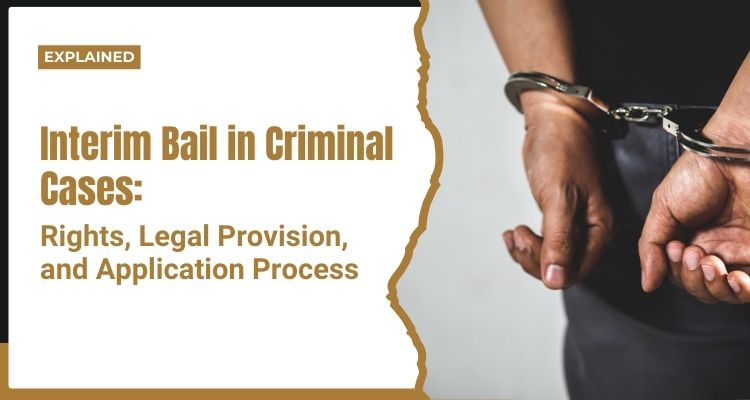Interim Bail in Criminal Cases: Rights, Legal Provisions & Process

Posted Apr 2025
An Interim bail is a short-term relief to individuals caught in legal proceedings before the court decides on regular or anticipatory bail. There is no separate Section of interim bail in the Code of Criminal Procedure (CrPC), 1973, but certain restrictions also apply in this instance.
The time duration of interim bail can be extended, but if the person accused does not pay the court to keep or extend the temporary bail, they will lose their freedom and might be jailed or get a warrant.
Understanding the rights, legal rules, and application process of interim bail can be stressful for anyone facing criminal charges. However, this article will give you detailed information on interim bail and how to apply for interim bail in criminal cases.
Definition and Purpose of Interim Bail
Interim bail is a temporary release given to an accused person from custody under section 439. It is helpful only for a short duration of time until a full bail application can be considered. Interim bail is given when someone needs quick protection from arrest but hasn’t yet received regular bail.
Interim bail ensures that an accused person living in prison for a longer period than required has been waiting for their regular bail decision. It gives temporary relief until the court examines the regular bail request.
When and Why Interim Bail Granted
Interim bail is particularly granted in serious situations such as medical conditions or types of crime where the accused person needs instant protection from arrest.
Interim bail can be granted when:
- The person facing charges believes that they might get arrested for a serious crime.
- The accused person has a serious medical emergency in which urgent treatment is needed.
- The person facing charges has personal hardships, like being the only earner in the family.
- The investigation is taking so much time to be completed.
- The court believes the accusation is made to harm the accused prestige.
Role of Criminal Lawyer in Delhi in Interim Bail
A highly experienced criminal lawyer in Delhi plays an important role in obtaining interim bail by:
- Evaluating the legal basis for bail.
- Preparing and submitting the interim bail request
- Representing the client in court and explaining relevant points.
- Make sure that bail rules are followed properly to prevent cancellation.
How does Interim Bail differ from regular bail and anticipatory bail
Interim bail is a short-term measure granted when an accused needs immediate protection from arrest while awaiting a decision on regular or anticipatory bail. Regular bail is granted after arrest, allowing release from custody, while anticipatory bail is sought before arrest to prevent detention. Interim bail acts as a short-term safeguard.
Interim Bail
Interim bail is a short-term relief to individuals caught in legal proceedings before the court decides on regular or anticipatory bail. Before the hearing for regular or anticipatory bail, the accused is given temporary bail.
Regular Bail
Regular Bail allows a person arrested for a serious crime to get released from jail. Regular bail is given in such situations when a person has already been arrested.
Anticipatory Bail
Anticipatory Bail is a court order that allows an accused person to be released on Bail before they are arrested. A person can apply for anticipatory bail if they think the police might arrest them for a crime that does not allow automatic bail.
Interim Bail Under Sections of the Criminal Procedure Code (CrPC)
- Section 437 CrPC: This bail applies in serious situations and cases where bail is not granted spontaneously.
- Section 439 CrPC: Permit permission from the High Court and the Sessions Court for the authority to offer bail.
- Section 438 CrPC: Includes anticipatory bail rules by permitting interim bail before the ending decision.
- Section 125 CrPC: It covers the rights for the maintenance of a specific group of people.
- Section 133 CrPC: It covers the right to remove public disturbance.
- Section 144: It prohibits gatherings of four or more people.
Process of Applying for Interim Bail (Step-by-step Process)
To apply for interim bail in India, here are some steps that need to be followed systematically. However, if you find it a complex process, you can directly hire a criminal lawyer, and get your work done –
- Step 1: Consult a Legal Professional
- Step 2: Prepare the bail application consisting of the personal information of the Applicant and case details.
- Step 3: Apply to the relevant court, like the Supreme Court or District Court.
- Step 4: Legal proceedings and discussion
- Step 5: The Court’s Decision on the Interim Bail with conditions like submitting the passport and daily check-ins with the police.
How Chambers of Mohit Singh Can Help You in Interim Bail
Mohit Singh leading criminal lawyer in Delhi with vast experience in various segments of criminal cases. He can help in serving interim bail applications as well as increase the date for interim bail. Apart from that, with the help of the chambers of Mohit Singh, you will get the following assistance –
- Mohit Singh examines the case details and recommends the most effective legal procedures for securing interim bail.
- He makes sure that the application is up-to-date and systematic, providing solid legal grounds to increase the chances of approval.
- He takes care of the filing procedures, assuring that all the important documents are submitted on time.
- He assures that all the important points are covered to increase the chances of favorable results.
- He assists the applicant in meeting all the legal requirements to prevent any issues.
Common Misconceptions About Interim Bail
Interim Bail is frequently misunderstood especially with anticipatory bail, parole, and other confusions which causes misconceptions about its scope and restrictions. Here are some common misconceptions:
Interim Bail Provides Long-term relief
It is a big misconception that interim bail provides permanent relief; it provides short-term or temporary relief granted until the court decides on regular bail. It does not provide permanent freedom.
Interim Bail is given without conditions
The court approves interim bail only after evaluating factors like Crime severity, risk of escape, and cooperation with the investigation.
Interim Bail is easy for anyone to get
The applicant must show a valid excuse for interim bail; it is not given instantly.
Interim bail conditions are not required to be followed
The court sets some rules like resigning a passport or checking in with the police. Destroying these rules can cancel your bail.
Interim Bail means the case is over
Interim bail is only temporary; the case continues, and the court can still disapprove regular bail.
Conclusion
Interim Bail can provide temporary relief, approved under particular consequences to prevent unnecessary difficulty. It differs from regular and anticipatory bail because of its short-term environment and instant necessity. Legal provisions under the CrPC govern its application, and a skilled criminal lawyer like Mohit Singh plays a crucial role in securing it.
Knowing the process and correcting misconceptions helps in understanding legal rights better. You may seek the help of the best criminal lawyer in Delhi to handle your case and ensure successful interim bail.

